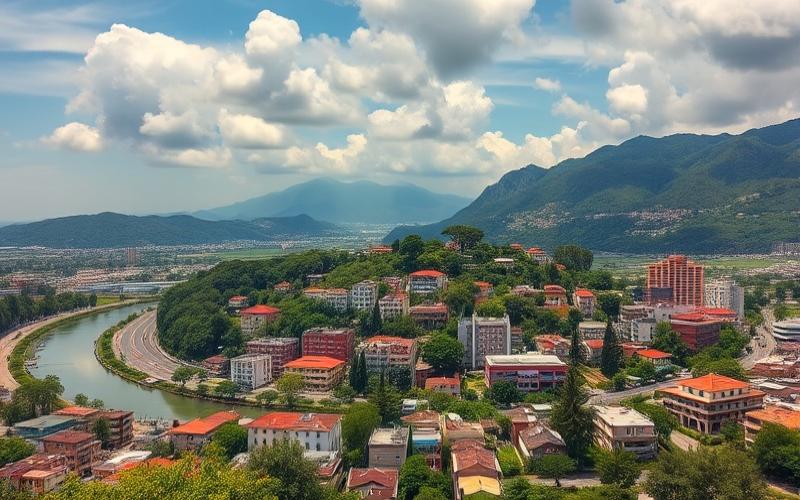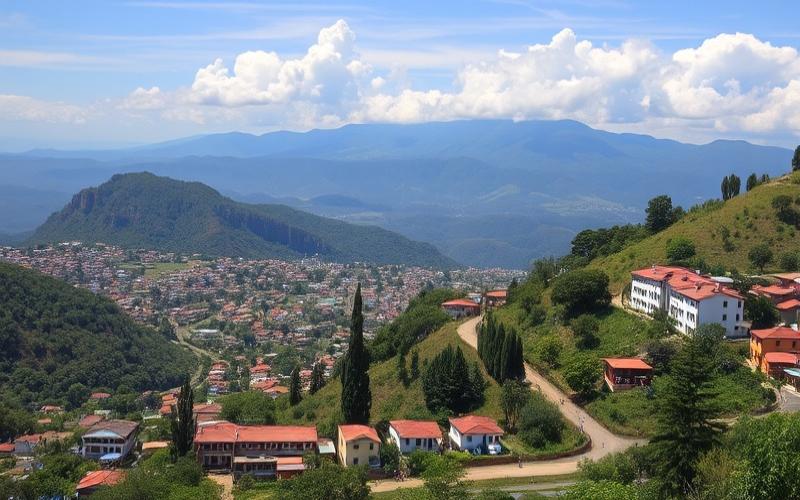
 Published on and written by Cyril Jarnias
Published on and written by Cyril Jarnias
Immersing yourself in a new culture is a rewarding adventure, and learning the local language is an essential step to truly integrate, especially in a vibrant country like El Salvador.
This Central American nation, known for its warm welcome and biodiversity, offers expatriates a unique opportunity to improve their Spanish while building meaningful connections.
Whether you’re a beginner or already have some knowledge, this article explores the essential methods and resources for mastering Salvadoran Spanish, ranging from learning apps to language exchanges with locals.
By diving into this linguistic experience, you’ll not only be able to share a pupusa with the locals but also better understand the richness of their culture and daily life.
Understanding the Importance of the Local Language in El Salvador
History of the Local Language: Spanish
Spanish became the dominant language in El Salvador following the Spanish conquest in 1524. This language was introduced by the conquistadors, notably Pedro de Alvarado, and gradually replaced indigenous languages like Nahuatl spoken by the Pipils and Mayan languages spoken by the Lencas and Pocomans. Spanish was imposed as the official language, profoundly influencing Salvadoran culture and identity.
Impact on Daily Life
Spanish is omnipresent in the daily life of Salvadorans. It is used in all aspects of society, from education to everyday communication. Social interactions are largely facilitated by the language, enabling people to communicate effectively and fully participate in the country’s social and cultural life.
Expatriate Experiences
For expatriates, learning Spanish is crucial for successful integration into Salvadoran society. Here are some benefits experienced by expatriates:
- Social Integration: Learning Spanish allows you to connect with the local community, understand customs and traditions, and participate in cultural events.
- Facilitation of Interactions: Expatriates who speak Spanish can navigate daily life more easily, such as shopping or using public services.
- Strengthening Relationships: Learning Spanish helps strengthen bonds with local colleagues and friends, which is essential for a positive experience in El Salvador.
Cultural and Traditional Importance
Understanding Spanish allows for a better grasp of Salvadoran cultural nuances and traditions. This includes participating in festivals, understanding local customs, and appreciating Salvadoran literature and music.
Professional Benefits
| Benefits | Explanations |
|---|---|
| Employment Opportunities | Better understanding of local needs and business practices. |
| Effective Communication | Facilitates communication with local colleagues and clients. |
| Market Integration | Enables better understanding of economic trends and business opportunities. |
In summary, Spanish is an essential component of Salvadoran culture and identity. Learning this language is crucial for successful integration and to fully leverage the social and professional opportunities the country offers.
Good to Know:
Learning Spanish, the official language of El Salvador born from colonization and deeply rooted in cultural identity, not only allows for smoother social and professional integration but also an understanding of the nuances of local traditions appreciated by expatriates. Knowing the language opens doors in the Salvadoran job market and enriches daily experiences through more authentic interactions.
Effective Learning Strategies for Expatriates
Effective Learning Strategies for Expatriates in El Salvador – Language Immersion and Cultural Understanding
Language immersion is one of the most effective approaches to mastering Spanish in El Salvador, as it allows for the integration of the local dialect’s peculiarities and the country’s specific customs.
Language Immersion Techniques Adapted to El Salvador:
- Daily Language Practice: Committing to speaking Spanish every day, even during simple activities, promotes automation and confidence. Regular exposure to local accents and expressions helps assimilate variants specific to El Salvador, such as the use of voseo or typical expressions.
- Consumption of Local Media:
- Listening to Salvadoran radio to get used to the musicality of the language and the country’s current events.
- Watching local television (news, shows, series) to enrich vocabulary and grasp cultural references.
- Participation in Community Events:
- Taking part in festivals, markets, religious or sports events to practice the language in authentic contexts and understand social codes.
Practical Tips to Strengthen Learning:
- Create conversation groups with natives to encourage spontaneous exchanges, correct mistakes, and discover the subtleties of everyday language.
- Engage with local tutors or teachers, whether for private lessons or in small groups, to benefit from personalized guidance focused on the Central American dialect.
- Use mobile apps adapted to Central American Spanish:
- Duolingo, Babbel, Memrise (selecting Latin American Spanish)
- Tandem or HelloTalk to practice with native speakers, especially Salvadorans.
Benefits of Language and Cultural Exchanges:
Regularly exchanging with local friends or colleagues allows for learning idiomatic expressions, better understanding humor, gestures, and integrating essential cultural benchmarks for communication.
These interactions also promote social and professional integration while consolidating language mastery in various situations.
Importance of Persistence and Regularity:
Learning a language requires consistency; it is recommended to practice every day, even briefly, to progress sustainably.
Perseverance in the face of linguistic or cultural difficulties is a key factor for success.
| Local Resources for Learning Spanish in El Salvador |
|---|
| Language Schools: Several institutions in San Salvador and Suchitoto offer courses adapted to all levels, in small groups or individually, with experienced local teachers. |
| Cultural Workshops: Cultural centers and associations offer workshops in cooking, dance, crafts, theater, or music, allowing for practical immersion in Salvadoran culture. |
| Immersion Programs: In Suchitoto, for example, there are programs that combine Spanish lessons, cultural activities, and volunteering, promoting learning in real contexts. |
| Universities and French Alliances: Some local universities and international centers offer programs for foreigners, including modules on Central American linguistic peculiarities. |
List of Practical Recommendations:
- Join a local language school upon arrival.
- Participate in workshops or community events each week.
- Use Salvadoran radio or television daily.
- Sign up on language exchange platforms to practice with natives.
- Schedule regular meetings with a tutor or conversation group.
- Actively explore local customs to enrich language learning through cultural experience.
Immersion in daily life and Salvadoran culture, combined with regular and targeted practice, is the key to effective and lasting language learning for expatriates.
Good to Know:
Participating in local festivals or joining sports clubs in San Salvador can enrich cultural immersion while offering authentic language practice. The Instituto Cervantes offers specialized courses to understand Central American Spanish variations.
Resources and Tools for Language Immersion
For linguistic immersion in Salvadoran Spanish, several tools and resources are available:
Mobile Apps and Online Platforms
Although apps specific to Salvadoran Spanish are rare, general Spanish learning platforms can be useful. Here are some options:
- Drops: An app offering interactive lessons to learn Spanish, though not specifically adapted to the Salvadoran dialect.
- Las apps de El Salvador: An app that allows you to discover Salvadoran apps and games, though not specifically dedicated to language learning.
Local Courses and Workshops
Cultural centers and universities in El Salvador offer direct language immersion opportunities:
| Center/Organization | Type of Course |
|---|---|
| Central University of El Salvador | Spanish courses for foreigners |
| Instituto Cervantes | Spanish courses with a focus on local culture |
| Local cultural centers | Conversation and culture workshops |
Conversation Groups and Language Tandems
Participating in conversation groups or language tandems in San Salvador and other major cities is essential for improving language skills:
- Conversation Groups: Organized in cafes or cultural centers, these groups allow you to practice Spanish with locals.
- Language Tandems: Partnerships between native speakers and learners to exchange languages and cultures.
Community Activities and Local Events
Integrating into community activities or participating in local events is crucial for simultaneously improving cultural and linguistic understanding:
- Cultural Festivals: Participating in festivals to discover culture and practice the language.
- Volunteering: Engaging in volunteer activities to interact with the local community.
Audiovisual Resources
Local television and radio stations offer daily exposure to the Salvadoran language:
- TCS (Telecorporación Salvadoreña): A local television channel broadcasting programs in Spanish.
- Radio Nacional de El Salvador: A national radio station broadcasting programs in Spanish.
Good to Know:
Lingopie and Babbel offer modules on the Salvadoran dialect, and Don Bosco University in San Salvador provides direct immersion workshops; don’t forget to join language tandems in local cafes or attend cultural events for a more enriching experience.
Essential Vocabulary for Daily Life in El Salvador
Common Greetings and Polite Expressions
| Salvadoran Spanish | Translation / Usage | Approximate Pronunciation |
|---|---|---|
| ¡Quiúbole! | Hey (informal) | |
| ¿Qué ondas? | What’s up? / How’s it going? | |
| ¡Vaya pues! | Okay / See you later / Alright | |
| ¡Adiós! | Goodbye | |
| ¡Sal! | Bye / See you next time (very informal) | |
| Mucho gusto | Nice to meet you | |
| Disculpe | Excuse me / Sorry | |
| Gracias | Thank you |
Practical Questions for Asking Directions or Information
- ¿Dónde está ___? (Where is ___?)
- ¿Cómo llego a ___? (How do I get to ___?)
- ¿Me puede ayudar? (Can you help me?)
- ¿Cuánto cuesta? (How much does it cost?)
Useful Phrases for Shopping and Restaurants
- ¿Tiene menú? (Do you have a menu?)
- Quisiera pedir ___ (I would like to order ___)
- ¿Me puede traer la cuenta? (Can you bring me the check?)
- ¿Aceptan tarjeta? (Do you accept cards?)
- ¿Hay pupusas? (Are there pupusas? — traditional dish)
Typical Salvadoran Expressions and Words
| Term/Expression | Meaning |
|---|---|
| ¡Púchica! | Darn! / Shoot! (exclamation of surprise or annoyance) |
| Está yuca | It’s tough / difficult |
| Bicho/Bicha | Kid / Young person |
| Chero/Chera | Friend / Pal |
| Alero | Close friend / Best friend |
| Chivo | Cool / Awesome |
| Cabal | Exactly / Perfect |
| Bayunco | Crazy / Fool / Joker |
| Chucho | Dog |
| Bajonear | To eat a lot, often after a party |
| Aguja | To be ready, vigilant, focused |
| Cipote/Cipota | Child, synonym of bicho |
| Achis | Expression of surprise |
| Cachito | A little / A moment |
| Remada | Long walk / significant effort |
Salvadoran Pronunciation and Syntax Tips
“Vos” often replaces “tú” (you) when addressing someone informally. Example: ¿Vos cómo estás? (How are you?)
Many expressions use apocopes or diminutives: un ratito (a little while) → un ratín.
Final vowels are sometimes swallowed in speech, especially in informal contexts.
Words of Nahuatl origin (indigenous language) are common, especially for food or customs: pupusa, tamal, atol.
Terms Related to Culture and Customs
- Pupusa: iconic dish, stuffed corn cake.
- Fiesta patronal: patron saint festival of the village or town.
- Día de la Cruz: religious holiday on May 3rd.
- Cabal: used daily to validate a statement or show the accuracy of a point.
Practical Tip:
Frame your requests with “Disculpe” for politeness, and often end with “por favor” or “gracias”.
¡Vaya pues!
Use this expression to say goodbye or mark the end of a conversation in a natural and local way.
To Remember:
To integrate, don’t hesitate to use diminutives and adopt the warm and direct tone characteristic of Salvadorans, favoring familiarity in daily exchanges.
Good to Know:
Key greetings include “buenos días” to say hello, “¿cómo estás?” to ask how you are, and “gracias” to thank someone, while for ordering at a restaurant, “quisiera” followed by the desired dish is practical; moreover, “vos” is commonly used instead of “tú” to address someone informally.
Disclaimer: The information provided on this website is for informational purposes only and does not constitute financial, legal, or professional advice. We encourage you to consult qualified experts before making any investment, real estate, or expatriation decisions. Although we strive to maintain up-to-date and accurate information, we do not guarantee the completeness, accuracy, or timeliness of the proposed content. As investment and expatriation involve risks, we disclaim any liability for potential losses or damages arising from the use of this site. Your use of this site confirms your acceptance of these terms and your understanding of the associated risks.























